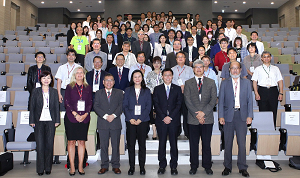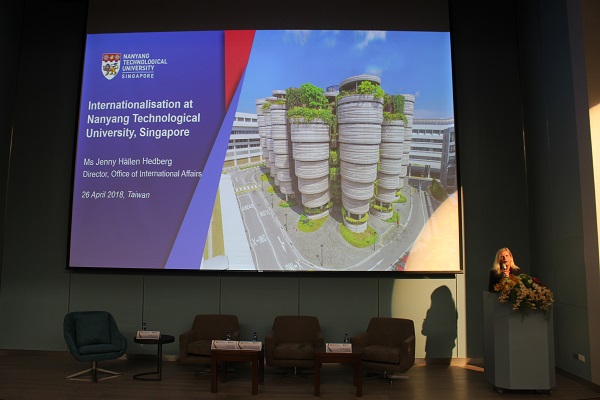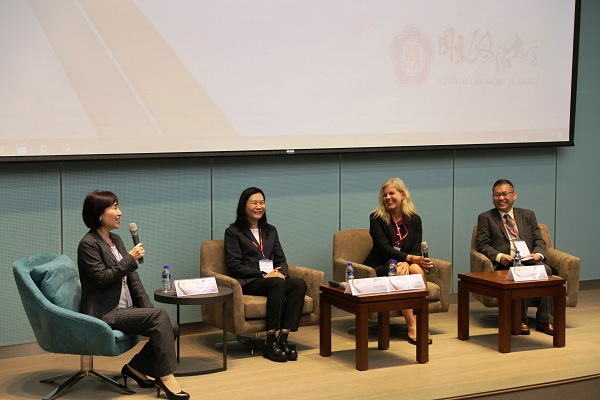:::
Revealing the Secrets to Success in University Rankings – NCCU Hosts the Very First QS Workshop on Branding and Rankings in Taiwan
Special Column
Poster:Ms. Ching-Yi Hsu ╱ Post date:2018-04-20 by Christian Schoppmeyer /OIC Campus Reporter
While NCCU is considered a top university with particular strengths in social science and humanities, NCCU President Edward Chow (周行一) reminded everyone about the importance of university rankings for Taiwan's institutions of higher education. That is, especially in the light of more and more powerful regional competitors from Singapore (Singaporean universities; in fact, occupy the top two positions in the 2018 QS Asia University Rankings), Hong Kong, China, South Korea, and Japan. NCCU, having being honored to serve as the host of the first QS Workshop on “Branding and Rankings” in Taiwan, therefore attracted numerous high-level guests from universities all across the island on April 26. Heads of universities, professors, and students alike were eager to draw from the insights and experiences of the three invited presenters and to learn more about reputation, branding and internationalization strategies.
Mandy Mok, the CEO of QS Asia, initiated the discussion by giving a detailed account on the criteria upon which every university's performance is being assessed. Ms. Mok mentioned that by understanding how the provided data for every criterion is being analyzed, universities can use this knowledge to their advantage and score much higher in the annual rankings. She thereby emphasized on the importance of marketing and university branding. While having visited over 250 universities and with 17 years of experience, Ms. Mok realized that it is essential for universities “to make as much noise as possible, to do something bizarre, and to stick out”.
Promoting a university in a creative way (which, as her case study has shown, could even include printing the university logo on a passenger aircraft) and thereby using any medium possible is key. According to Ms. Mok, the hard truth is that if people do not notice a university and cannot find the institution in the ranking tables, they will simply assume one is not good enough or does not exist. Yet, ways of increasing a university's exposure are abundant: Universities may decide to take part in global student recruitment fairs, create strategic partnerships with well-established universities abroad and host joint events, participate in the QS news outlets, or reach out to regions and markets that are less explored.
Subsequently, Samuel Wong, a Senior Researcher at QS Asia, shared his practical insights on how universities can improve their current ranking by following a number of steps. In this regard, Mr. Wong elaborated specifically on the indicators concerned with the faculty-student ratio, citation per paper, and the academic and employer reputation. The latter is highly dependent on the contact lists that universities provide for the QS Asia survey. The provision of a larger amount of domestic contacts is highly recommended, while universities shall preferably provide up to 400 contacts.
Guest speaker Jenny Hallen Hedberg, the Director of the Office of International Affairs at Nanyang Technological University (NTU) in Singapore, introduced the university's journey to the very top of the QS Asia ranking. Achieving an impressive faculty-student ratio of 1/4 and having acquired over 1000 industry partners from around the world, represent some of the aspects that have contributed to the very positive ranking in recent years. Moreover, NTU is consistently applying the flipped classroom teaching method. Lessons designed in such a way do not focus on the professor, but on students instead, which fosters team-based learning. On the other hand, Singapore's very unique case with conditions in terms of budget and internationalization that can hardly be found at any other location, has also played a major role.



Left: NCCU Hosts the Very First QS Workshop on Branding and Rankings in Taiwan. Photo: OIC.
Middle: Jenny Hallen Hedberg presents Nanyang Technological University’s QS success story. Photo: OIC.
Right: The subsequent Q&A session allowing all workshop attendees to ask their respective questions. Photo: OIC.
While NCCU is considered a top university with particular strengths in social science and humanities, NCCU President Edward Chow (周行一) reminded everyone about the importance of university rankings for Taiwan's institutions of higher education. That is, especially in the light of more and more powerful regional competitors from Singapore (Singaporean universities; in fact, occupy the top two positions in the 2018 QS Asia University Rankings), Hong Kong, China, South Korea, and Japan. NCCU, having being honored to serve as the host of the first QS Workshop on “Branding and Rankings” in Taiwan, therefore attracted numerous high-level guests from universities all across the island on April 26. Heads of universities, professors, and students alike were eager to draw from the insights and experiences of the three invited presenters and to learn more about reputation, branding and internationalization strategies.
Mandy Mok, the CEO of QS Asia, initiated the discussion by giving a detailed account on the criteria upon which every university's performance is being assessed. Ms. Mok mentioned that by understanding how the provided data for every criterion is being analyzed, universities can use this knowledge to their advantage and score much higher in the annual rankings. She thereby emphasized on the importance of marketing and university branding. While having visited over 250 universities and with 17 years of experience, Ms. Mok realized that it is essential for universities “to make as much noise as possible, to do something bizarre, and to stick out”.
Promoting a university in a creative way (which, as her case study has shown, could even include printing the university logo on a passenger aircraft) and thereby using any medium possible is key. According to Ms. Mok, the hard truth is that if people do not notice a university and cannot find the institution in the ranking tables, they will simply assume one is not good enough or does not exist. Yet, ways of increasing a university's exposure are abundant: Universities may decide to take part in global student recruitment fairs, create strategic partnerships with well-established universities abroad and host joint events, participate in the QS news outlets, or reach out to regions and markets that are less explored.
Subsequently, Samuel Wong, a Senior Researcher at QS Asia, shared his practical insights on how universities can improve their current ranking by following a number of steps. In this regard, Mr. Wong elaborated specifically on the indicators concerned with the faculty-student ratio, citation per paper, and the academic and employer reputation. The latter is highly dependent on the contact lists that universities provide for the QS Asia survey. The provision of a larger amount of domestic contacts is highly recommended, while universities shall preferably provide up to 400 contacts.
Guest speaker Jenny Hallen Hedberg, the Director of the Office of International Affairs at Nanyang Technological University (NTU) in Singapore, introduced the university's journey to the very top of the QS Asia ranking. Achieving an impressive faculty-student ratio of 1/4 and having acquired over 1000 industry partners from around the world, represent some of the aspects that have contributed to the very positive ranking in recent years. Moreover, NTU is consistently applying the flipped classroom teaching method. Lessons designed in such a way do not focus on the professor, but on students instead, which fosters team-based learning. On the other hand, Singapore's very unique case with conditions in terms of budget and internationalization that can hardly be found at any other location, has also played a major role.



Left: NCCU Hosts the Very First QS Workshop on Branding and Rankings in Taiwan. Photo: OIC.
Middle: Jenny Hallen Hedberg presents Nanyang Technological University’s QS success story. Photo: OIC.
Right: The subsequent Q&A session allowing all workshop attendees to ask their respective questions. Photo: OIC.
Last modification time:2018-05-08 AM 9:49







